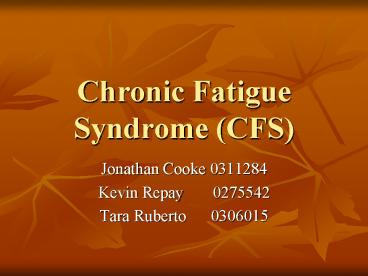Chronic Fatigue Syndrome (CFS) - PowerPoint PPT Presentation
1 / 12
Title: Chronic Fatigue Syndrome (CFS)
1
Chronic Fatigue Syndrome (CFS)
- Jonathan Cooke 0311284
- Kevin Repay 0275542
- Tara Ruberto 0306015
2
What is CFS?
- A condition characterized by persistent
debilitating fatigue, not relieved by rest and
not accounted for by any specifically identified
medical or psychiatric condition. - The cause of CFS is unknown and therefore
defined primarily by its symptoms
3
Common Symptoms of Chronic Fatigue Syndrome
- Frequent sore throats
- Painful lymph nodes
- Headaches
- Difficulty with concentration and memory
- Low-grade fever
4
Signs and SymptomsMajor Criteria
- New onset of persistent or relapsing fatigue, not
resolving with bed rest, and severe enough to
reproduce or impair average daily activities
below 50 of previous levels for at least six
months - Other clinical conditions that could cause
similar symptoms must be excluded by appropriate
medical evaluation. These other conditions
include, but are not limited to, malignancy,
autoimmune disease, localized infection, chronic
bacterial or parasite disease, endocrine
disorder, and other chronic disease
5
Signs and SymptomsMinor Criteria
- Mild fever
- Sore throat
- Painful lymph nodes in neck or underarm region
- Generalized muscle weakness
- Muscle discomfort or myalgia
- Prolonged generalized fatigue after levels of
exercise that were previously well tolerated - Generalized headache
- Mygratory arthralgia
- Neuropsychologic complaints
- Sleep disturbance
- History of symptom complex having begun acutely
following viral infection
6
Signs and SymptomsPhysical Criteria
- Low grade fever
- Non-exudative pharyngitis
- Palpable tender lymph nodes in neck
- To meet the case definition, clients must meet
both major criteria and a total of eight other
symptom criterias, or six symptom criteria and
two physical criteria.
7
Contraindicators for exercise with CFS
- Cold/humid weather
- Insuffiecient sleep
- Fatigue
- Excessive vigorous phsyical activity or
inactivity - Anxiety
- Stress
- Strenuous strength training exercises
8
Exercise Suggestions for Clients with CFS
- Aim for no more than three exercise sessions per
week. - Experiment to find the type of exercise that
works best for the client. Choose from a range of
gentle activities such as stretching, yoga, Tai
Chi, walking and light weight training. - Stretching seems to be well tolerated by people
with CFS. Clients may prefer to perform your
stretching program while lying down in bed. - Aerobic exercise seems to cause relapses for many
people with CFS. If this is true for the client,
try non-aerobic forms of exercise like weight
training with light weights. - Learn from past relapses. For example, if walking
for 20 minutes worsened the clients symptoms,
try walking for five minutes and see how that
goes. It may be helpful to keep a diary to keep
track of what works and what doesnt for the
client.
9
Exercise Suggestions for Clients with CFS cont.
- Stop the physical activity well before the client
feels tired. Pacing is very important. - Remember that the clients exercise tolerance
will differ from one day to the next. - Listen to your body if the client doesnt feel
up to exercising on a particular day, dont. - Only slowly increase the intensity, time spent or
frequency of exercise when the client knows he or
she can cope with it. For example, if the client
can exercise for five minutes without suffering a
relapse, try for six minutes.
10
Recommendations for Exercise Programming Cont
- Strength training exercises should be based on
preservation of levels of strength - Progression of exercise activity should focus
primarily on increasing the duration of moderate
intensity activities instead of increasing
exercise intensity - Emphasize use of motivational cues social and
extrinsic - Avoid eccentric or upper extremity overhead
loading - Supervise and control with follow up support
- Avoid early morning exercise
- Ensure adequate time and attention for client
11
Special Considerations
- Depression may accompany condition as lifestyle
changes occur due to persistent symptoms - Often clients will express frustration as people
are not sympathetic to their condition - Clients tend to cope with symptoms by planning
acivities to budget their energy
12
References
- Mondell, D. L. (c2005.). Living with chronic
fatigue syndrome 4 steps to manage pain and lead
a fulfilling life / (1st ed. ed.). New York
McGraw-Hill,. - Sietsema, K. E. (1997). Chronic Fatigue Syndrome.
In J.L. Durstine G.E. Moore (Eds.), American
College of Sports Medicine Exercise Management
for Persons with Chronic Diseases and
Disabilities. (pp.141-145). Windsor Human
Kinetics - Wallace, Daniel J. (Daniel Jeffrey),1949-.
(2002.). All about chronic fatigue syndrome.
Oxford New York Oxford University Press,.































